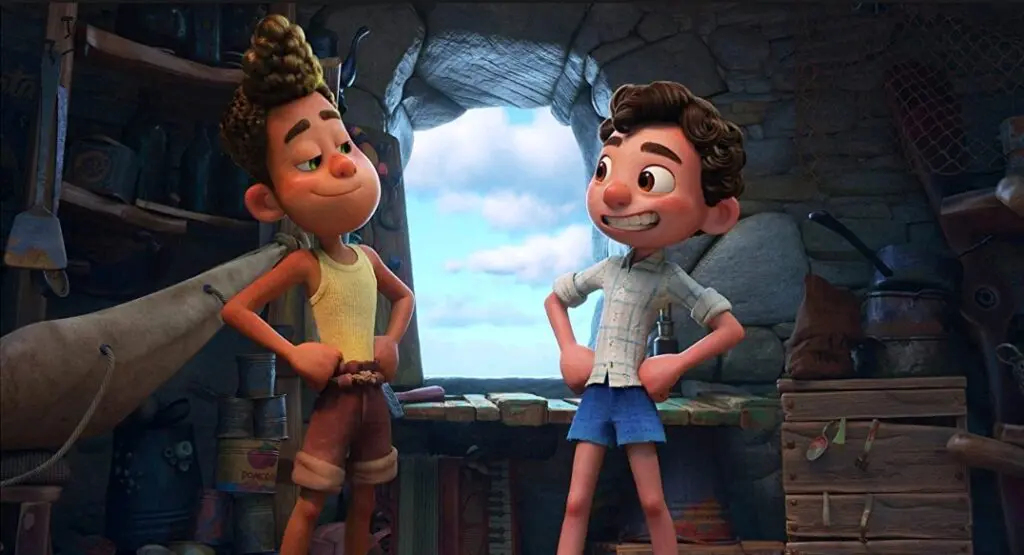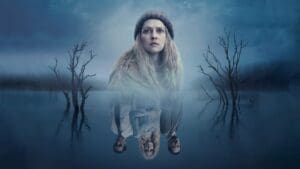Summary
Luca is a charming film with a more relaxed Pixar style that’s made for the dreamers in all of us.
Streaming services and movie theatres know that the Pixar stamp carries a lot of weight with animated film fans and parents. I’m not sure if they ever made a bad film; perhaps except Brave and Cars 3, nearly all of them have cleared the nearly impossible standard the studio set for themselves. What Pixar has with Luca is a charming little film that feels small, in comparison to the other worlds the studio has put together. It’s a charmer, for sure, but the animated filmmakers here may have suffered from limiting the film to the 90-minute mark to make it easier to stream on Disney +.
Luca takes place around world peacetime, right after the last World War in the 1950s. Though, our hero, Luca (voiced by Room‘s Jacob Trembley) doesn’t know much about that. You see, he is an adorable little sea monster who has always been taught to stay away from the above-water land. He is a curious fellow, and we all know boys are put on this earth to worry their parents. So, when he ventures off above water, he sees Alberto (Shazam’s Jack Dylan Glazer) a slightly older, let’s say a teenaged sea monster, who has been living in the human Riveria for years.
The catch is their rainbow-colored fins and skin turn into human camouflage, taking the shape of normal adolescent boys. If they get wet, however, their secret identity will be revealed. They forge a friendship filled with Italian treats and the urge to buy a Vespa to voyage out to the great above-land unknown. To help them, they meet Guilia (Emma Berman, making her feature film debut), who enters a yearly race. The prize money will help them buy the Vespa of their dreams… Or just one that moves. The question remains do they trust Guilia enough to keep their secret?
Long-time Pixar team member and director Enrico Casarosa (he received an Academy Award nomination for his animated short film La Luna) reportedly based the film on Casarosa’s childhood growing up in Genoa. The animators even spent time in the Italian Riveria (poor bastards), gathering research about the culture, the people, and to take in the eye-catching local scenery. The result is a charming, small-scale, authentic feel— well, as much as animated films can capture.
Casarosa is working from a script that has quite the pedigree. It comes from novelist/screenwriter Jesse Andrews, of Me, Earl, and the Dying Girl fame. Also, from Mike Jones, the scribe who brought us the groundbreaking Soul last year. With Casarosa’s influence, they captured the essence of another time and place, which is what great films do. However, if you go in thinking you are going to be treated to a vast world with an abundance of zany characters (think of films like the Toy Story series, A Bug’s Life, The Incredibles, the list goes on), you may be sadly disappointed. This is a smaller scale, and you won’t see many of the same Pixar players that you may be accustomed to.
The best part of the film is some of the animation (more on that later) and the cute friendship development between Luca and Guilia. Berman has some of the film’s best interactions including a very funny moment when she smacks her forehead and is exasperated at her new friend’s stupidity. That follows up with an adorable revelation of how happy she has been since meeting Luca. The others are Marco Barricelli voicing Guilia’s stoic and stormy fisherman father and the genius casting of Sandy Martin as Luca’s scene-stealing grandmother.
Where the film falters a bit is its limited scope. At only an 84-minute running time, the creators don’t spend enough time under the sea with Luca’s home. This limits the effectiveness of Maya Rudolph and Jim Gaffigan’s comedic voice work, which the film could have used more of. More time is invested with some gorgeous visuals, including Luca riding a Vespa on Saturn’s rings, that remind you of Soul‘s “Great Beyond.” That does play well with the theme of Luca looking for more than his home has to offer, like education.
Now, let’s talk some spoilers, so skip this section if needed. The friendship between Guilia and Luca is much stronger than the one with Alberto. So, when it comes to the final scene the film has been building towards, it feels unearned. It would have been a much stronger ending if Guilia said goodbye to Luca, and sending him off into the world where our little dreamer is set free.
Also, they missed a major chance that I still cannot believe they overlooked. When tears are shed between Luca and Alberto, to have that water reveal their true colors on their cheeks. Every time a drop of water hits their skin, they would scramble to dry themselves as if they were ashamed of who they truly are. How apropos would it have been for them to ignore their tears and finally embrace their true nature? Not to mention the stunning visual.
Still, the message the team brings to Luca is about dreaming for more and never being ashamed of who you are. Which is timely, astute, and correct. While many may complain about the first hour, that’s if you are used to Pixar’s assault of character, plot, and action, you will be rewarded with two great scenes; one is the ending shot, which lifts the film to that lofty Pixar standard we talked about.


